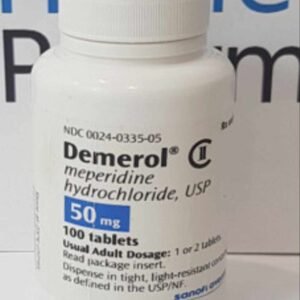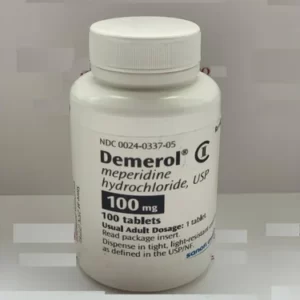When it comes to managing acute pain, choosing the right medication is crucial. Two commonly used opioids for pain relief are Demerol vs (also known as meperidine) and Morphine. Both medications have their benefits and considerations, and understanding their differences can help healthcare professionals and patients make informed decisions regarding pain management.
-
 Demerol For Sale (Meperidine) 50mg$40.00 – $180.00
Demerol For Sale (Meperidine) 50mg$40.00 – $180.00 -
 Demerol For Sale (Meperidine) 100mg$50.00 – $250.00
Demerol For Sale (Meperidine) 100mg$50.00 – $250.00
I. Understanding Demerol
Demerol, or meperidine, is a synthetic opioid analgesic that has been used for decades to alleviate moderate to severe pain. It works by binding to opioid receptors in the central nervous system, blocking pain signals and providing relief. Demerol is available in various forms, including tablets, injections, and oral solutions.
A. Effectiveness of Demerol
Demerol has shown effectiveness in managing acute pain in opioid-dependent patients. A study conducted by Solhi et al. compared the pain relief provided by Demerol and Morphine in opioid-dependent patients with acute pain. The study concluded that patients receiving Demerol reported a lower level of pain control compared to those receiving Morphine. Therefore, for patients with opioid dependency, Demerol may not be the optimal choice for pain management.
B. Side Effects of Demerol
Like any medication, Demerol may cause side effects. Common side effects include nausea, vomiting, constipation, dizziness, and sedation. It is important to note that Demerol has a higher risk of causing withdrawal symptoms in opioid-dependent patients, as observed in the study by Solhi et al. Therefore, healthcare professionals need to consider these factors when prescribing Demerol.
C. Availability of Demerol
Demerol is a regulated medication and is only available with a prescription. It is essential to consult a healthcare professional to assess the patient’s condition and determine if Demerol is the appropriate choice for pain management.
II. The Power of Morphine
Morphine is a naturally occurring opioid derived from the opium poppy plant. It has been widely used for pain relief for many years and is considered the gold standard in opioid analgesics. Morphine is available in various forms, including tablets, injections, and extended-release formulations.
A. Superior Pain Control with Morphine
Numerous studies have shown the effectiveness of Morphine in providing pain relief. In the study conducted by Solhi et al., patients receiving demerol vs morphine reported better pain control compared to those receiving Demerol. Morphine’s potency and ability to bind to opioid receptors make it a reliable choice for managing acute pain.
B. Considerations with Morphine
While Morphine is highly effective in pain management, it is not without considerations. Like Demerol, Morphine can cause side effects such as nausea, constipation, drowsiness, and respiratory depression. Healthcare professionals must closely monitor patients receiving Morphine to mitigate these risks.
C. Availability of Morphine
Morphine is a controlled substance and is available with a prescription. Healthcare professionals carefully evaluate the patient’s condition and medical history to determine if Morphine is the most appropriate choice for pain management.
III. Choosing the Right Medication
When deciding between Demerol vs Morphine for pain management, healthcare professionals consider various factors, including the patient’s medical history, pain severity, and potential side effects. It is crucial to assess each patient individually to determine the most suitable medication.
A. Patient Dependency
As highlighted in the study by Solhi et al., patients with opioid dependency may not experience optimal pain relief with Demerol. In such cases, Morphine may be a more effective choice. Healthcare professionals should thoroughly evaluate the patient’s history of opioid use and consider alternative pain management strategies if necessary. demerol vs morphine
B. Pain Severity
The severity of the patient’s pain plays a vital role in selecting the appropriate medication. If the pain is moderate to severe, Morphine’s potent analgesic properties make it a preferred choice. However, for patients with mild pain, Demerol may still provide adequate relief.
C. Side Effects and Tolerance
The potential side effects and the patient’s tolerance to opioid medications should also be taken into account. If a patient has a history of adverse reactions to a specific opioid, healthcare professionals may consider alternatives or adjust the dosage accordingly.
D. Individual Response
Each patient may respond differently to pain medications. Close monitoring of the patient’s response to Demerol vs Morphine is necessary to ensure optimal pain control and minimize side effects. Adjustments in dosage or medication may be required based on individual needs.
IV. Frequently Asked Questions (FAQ)
1. Can Demerol be used for long-term pain management?
Demerol is not typically recommended for long-term pain management due to its potential for causing withdrawal symptoms and its association with opioid dependency. Healthcare professionals usually consider other opioids or non-opioid alternatives for chronic pain management.
2. Is Morphine stronger than Demerol?
Morphine is generally considered to be more potent than demerol vs morphine. Its affinity for opioid receptors and its effectiveness in managing severe pain make it a powerful analgesic.
3. Are there any alternative pain medications to Demerol and Morphine?
Yes, there are other opioids and non-opioid medications available for pain management. Tramadol, oxycodone, and hydromorphone are some examples of alternative opioids. Non-opioid alternatives include acetaminophen, nonsteroidal anti-inflammatory drugs (NSAIDs), and adjuvant medications like gabapentin or pregabalin.
4. Can Demerol and Morphine be used together for pain management?
Combining Demerol vs Morphine is generally not recommended due to the increased risk of side effects and potential overdose. Healthcare professionals carefully evaluate the patient’s condition and consider alternative strategies before combining multiple opioids.
V. Conclusion
Demerol and Morphine are both viable options for pain management, but their differences and considerations must be carefully evaluated. While Demerol may be suitable for certain patients, Morphine’s potency and effectiveness make it the preferred choice in many cases. Healthcare professionals play a crucial role in assessing each patient’s individual needs and tailoring the pain management approach accordingly. By selecting the most appropriate medication, patients can receive optimal pain relief and improve their overall well-being.
Disclaimer: This article is for informational purposes only and should not replace professional medical advice. Consult a healthcare professional for personalized recommendations regarding pain management.



One thought on “Demerol vs Morphine: Choosing the Right Pain Medication”